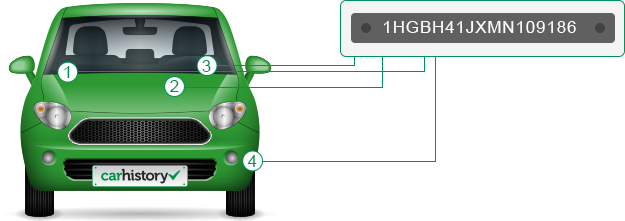
The vehicle identification number (VIN) is composed of 17 characters (digits and capital letters) that act as a unique identifier for the vehicle. A VIN displays the car's unique features, specifications and manufacturer.
The VIN can be found in a couple of places including on the car's registration label (1), on the compliance plate in the engine bay (2) or on the passenger side windshield (3), or on one of the door posts (where the door latches when it is closed) (4). See the image below:
If you've been scouting for a true bargain on a used car, you may have considered the option of securing the ride of your dreams at an auction. You'll have an idea of what you're looking for, knowing where you're willing to compromise and at what point to draw the line.
However, with the fast-paced excitement of the auctioneer rattling off numbers and the fierce competitiveness of your fellow bidders, how can you ensure your endeavour is a successful one?
Here we take at look at a few of the pros and cons as well as how you can come out on top.
Whilst car auctions can be a great way to get a good deal, they can also have a few pitfalls for the unwary buyer. With some thrifty bidding, you could drive away with a sizeable discount, but only if you've done your research.
"I don't think that auctions are the correct environment for people who know nothing about cars, because they expose themselves to mechanical risks," David Fowles, managing director at Fowles Auction Group told Drive. "[But] for mechanically literate people who understand cars, it's a wonderful way of buying."1
Consumer Affairs Victoria notes that the auction house is generally responsible for ensuring that a car is not financially encumbered, however, you have to bear in mind that you will not be able to take your car for a test drive before the bidding begins2.
A number of auction houses will allow you to inspect a car before the date of the auction, according to Australian Credit and Finance3, so it's a good idea to get a professional mechanic to take a look over it.
If you have access to a car's vehicle identification number (VIN) you can also request a copy of its CarHistory report, which will note possible odometer rollback and pricing for similar models.
As with any auction, it's important to go in with a fixed idea of what you're willing to spend, as well as an absolute upper limit if you should happen to go over this amount. Without a set budget, it can be easy to get lost in the adrenaline rush of the auction itself, which can result in you spending far more than you anticipated.
1Drive, Buying at auction. Accessed July, 2015.
2Consumer Affairs Victoria, Buying a used car at auction. Accessed July, 2015.
3Australian Credit and Finance, Top 10 Tips for Buying a Car at Auction. Accessed July, 2015.